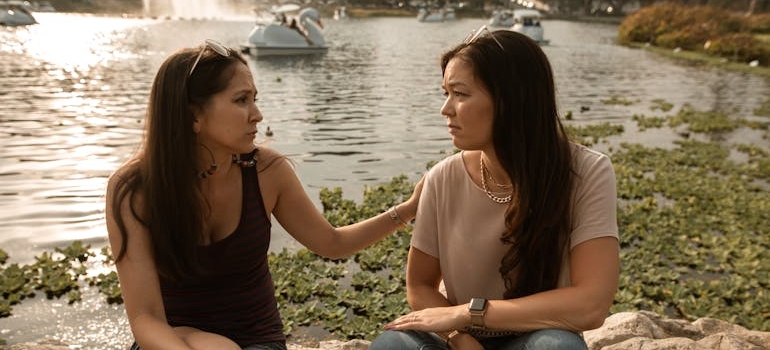Watching someone you care about struggle with addiction is heartbreaking, especially when they refuse help. You might feel helpless, frustrated, or even angry—but there are steps you can take. Knowing what to do when someone doesn’t want help can make a difference. It’s about learning how to communicate, set boundaries, and explore treatment options like detox centers in WV. We’ll show you supportive ways to encourage change while protecting your well-being. You’re not alone, and even when it seems like nothing is working, small actions can plant the seeds for recovery. Stay hopeful, stay informed, and remember—help is available for both you and your loved one.
Defining Addiction: More Than Just a Habit
Addiction is more than just a habit; it’s a complex condition that significantly impacts brain function and behavior. At its core, addiction compels someone to use substances or engage in behaviors even when they bring harm. This might start as seeking pleasure or avoiding discomfort, but it quickly evolves into a necessity for daily functioning. Recognizing this can be the first step toward getting help.

For those struggling, especially with alcohol, reaching out to an alcohol rehab center Athens OH doctors recommend, can provide the necessary tools to start the recovery process. Such centers offer professional guidance and support, ensuring that individuals do not face their challenges alone. Seeking help is a sign of strength, not weakness. If you or someone you know is battling addiction, it’s crucial to seek support as soon as possible.
Common Signs of Denial in Addiction
Recognizing denial is a critical first step if you’re trying to help someone who isn’t ready to admit they have an addiction problem. Here are some common signs that often appear when your loved one won’t seek addiction treatment:
- Rationalizing behavior: They might make excuses for their substance use, blaming stress or social activities.
- Minimizing the issue: They claim their use is under control or not as bad as others think.
- Blaming others: They might say that problems in their life are caused by friends, family, or work, not their addiction.
- Avoiding the topic: They change the subject quickly or get angry when the topic of their substance use comes up.
- Continued use despite consequences: Even facing legal, health, or financial problems, they continue their behavior.
How to Educate Yourself About Addiction Starting the Conversation: Tips and Timing
Educating yourself about addiction is crucial before you approach a conversation with someone who might be struggling. If you’re wondering how you would help a friend struggling with drug addiction, these steps are a compassionate and practical start. Here’s how to start that conversation thoughtfully and at the right time:
- Learn about addiction: Understand that addiction is a complex disease affecting brain function and behavior. This knowledge will shape your empathy and approach.
- Choose the right moment: Wait for a time when your friend seems most receptive and sober. Avoid moments of high stress or conflict.
- Plan your words: Think about what you’ll say beforehand. Focus on expressing concern without judgment.
- Offer specific help: Suggest actionable steps they can take, like visiting a counselor or attending a support group meeting.
- Be ready for any response: Prepare yourself for denial or anger, and remember, the goal is to show support, not to force change.

How to Communicate Effectively
Effective communication is key when you’re trying to help someone with an addiction, especially if they are not yet ready to seek help. Start by ensuring that you’re both in a calm environment where you can speak openly without distractions. It’s important to use “I” statements, like “I feel worried about you,” rather than “You are doing something wrong,” which can lead to defensiveness. Listen more than you speak.
Giving them space to share their feelings and experiences without interruption shows that you value their perspective. Always speak with compassion and understanding, avoiding any judgment or criticism. If you’re unsure how to help a drug addict who refuses help, focus on building trust and a connection that encourages open dialogue. This approach may not change the situation immediately, but it lays a foundation for when they’re ready to listen.
Planning an Intervention: A Step-by-Step Guide
Planning an intervention might feel overwhelming, but it’s a powerful step towards helping someone caught in the grip of addiction, especially when it feels like they won’t seek help on their own. Here’s a simple guide to get you started:
- Gather a small, supportive team: Choose friends and family who truly care and won’t judge.
- Seek professional advice: Consult with a counselor or a specialist from a fentanyl detox center. Their expertise can guide the intervention’s approach.
- Plan your message: Everyone should share their feelings calmly and explain how the addiction has affected them.
- Choose the right time and place: Find a private, safe space and a time when your loved one is least likely to be under the influence.
- Have a clear plan for treatment: Know what to do when someone doesn’t want help. Offer specific options for immediate treatment and support.

When to Consider Professional Help
Deciding when to seek professional help can be tough, especially when you’re concerned about someone who might not see the need for it themselves. If you’re noticing persistent, harmful patterns in behavior, especially related to drug use, it’s time to consider expert intervention. Meth rehab in West Virginia offers specialized programs to help individuals recover from methamphetamine addiction in a supportive and structured environment.
Professional help becomes crucial when personal safety is at risk, when previous attempts at help have not led to improvement, or when the person’s daily functioning is severely impacted. Don’t wait for rock bottom; reaching out to professionals can provide the necessary support and resources to start the recovery process on solid footing. It’s about offering a lifeline, not waiting until it might be too late.
Finding and Choosing the Right Rehabilitation Program
Finding the right treatment can significantly lighten the load for your loved one struggling with addiction. By choosing a path tailored to their needs, you show them they’re not alone in this fight. This support can boost their morale and willingness to engage in the recovery process. Next, we’re going to go over some treatment options that you can consider to further help guide your loved one towards a healthier future.
Inpatient Rehabilitation Centers
If you’re feeling lost about what to do when someone doesn’t want help with their addiction, inpatient rehabilitation centers can be a lifesaver. These centers provide a structured environment where recovery is the top priority. At an inpatient drug rehab in WV, individuals receive round-the-clock care and support from professional staff trained to handle addiction issues.

This setting helps reduce the temptation and access to substances, significantly improving the chances of recovery. Treatments often include therapy sessions, both individual and group, and medical supervision, ensuring that the physical and psychological aspects of addiction are addressed. If you or someone you know is struggling, consider the supportive and focused environment that inpatient rehab offers—it could be the key to turning things around.
Outpatient Treatment Services
Outpatient treatment services offer a flexible approach to recovery, allowing you to get help without staying in a facility. An intensive outpatient program West Virginia has to offer focuses on helping you manage your addiction while you continue living at home. This setup is ideal if you have work or family commitments that require your daily presence.
These programs typically involve several hours of therapy each week, which includes counseling, group sessions, and sometimes educational workshops about addiction and recovery. The goal is to equip you with the skills and support you need to overcome addiction while maintaining your daily life. Outpatient care can be a powerful tool, providing essential support without putting your life on hold.
Detox Programs and Medical Assistance
Detox programs play a crucial role in the recovery journey, especially for those just starting out. These programs help clear the body of substances safely under medical supervision, providing a solid foundation for further treatment. For pregnant women, specific detox drug rehab for pregnant women offers tailored care that addresses both maternal and fetal health, ensuring safety throughout the process.

If you’re figuring out how to deal with a drug addicted person, understanding the benefits of professional detox can be a key first step. It’s not just about removing toxins; it’s also about stabilizing the individual medically and emotionally. Encouraging someone to enter a drug rehab program that includes detox can help them regain control over their life, providing both immediate and long-term support. Remember, each step forward is a step towards recovery.
Dual Diagnosis Treatment for Co-Occurring Disorders
Dual diagnosis treatment is crucial for individuals dealing with co-occurring disorders, such as mental health issues alongside substance abuse. This integrated approach tackles both problems simultaneously, offering comprehensive care that improves overall outcomes. If you’re unsure what to do when someone doesn’t want help, consider the benefits of dual diagnosis treatment:
- Enhanced understanding of complex needs: Treatment addresses both mental health and addiction, acknowledging how intertwined these conditions can be.
- Coordinated care: Therapy, medication management, and support are synchronized to treat all aspects of the individual’s health.
- Reduced risk of relapse: By treating the mental health condition, the triggers for substance use can be better managed.
- Improved quality of life: Comprehensive care leads to better mental health stability, substance use management, and overall life satisfaction.
Online vs. In-Person Groups: What Works Best?
Choosing between online and in-person support groups can significantly impact how to support someone who doesn’t want help. Each option has unique advantages that cater to different needs and preferences.
Online groups:
- Join from anywhere, which is great if transportation or mobility is an issue.
- Provides a sense of privacy and security, making it easier to share personal experiences.
- Sessions can often be scheduled around your daily responsibilities.
In-person groups:
- Face-to-face interactions can foster stronger emotional bonds.
- Being in a dedicated space can enhance focus and commitment to the recovery process.
- Direct access to help and feedback from peers and facilitators.

Dealing with a Relapse: Steps to Take
Relapse can be a challenging part of the recovery journey, but it’s important to remember that it doesn’t mean failure. It’s a sign to reassess and strengthen the approach to recovery. Here are practical steps to take if a relapse occurs:
- Recognize and accept: Acknowledge that relapse is a common part of the process. Accepting this can help reduce feelings of guilt and shame.
- Seek support: Immediately reach out to a therapist, support group, or trusted person who understands your recovery journey.
- Evaluate triggers: Identify what led to the relapse. Understanding these triggers is crucial for prevention in the future.
- Revise the recovery plan: Modify your existing treatment plan to incorporate new strategies or support mechanisms.
- Focus on health: Prioritize physical and mental health, which can include regular exercise, a balanced diet, and sufficient sleep.
- Stay committed: Keep a positive outlook and commit to continuing recovery, using the relapse as a learning opportunity.
Finding Hope in Challenging Times
As you support someone who is battling addiction, remember you’re not alone in this journey. What to do when someone doesn’t want help can seem daunting, but there are tools and strategies at your disposal. Stay persistent and patient. Look for professional support and consider resources like support groups and treatment centers. Every step you take builds a path towards hope and healing for both you and your loved one. Take care of yourself too; your strength is vital in this challenge. You have the power to make a significant difference, even in the toughest situations. Keep moving forward with hope and resolve.



